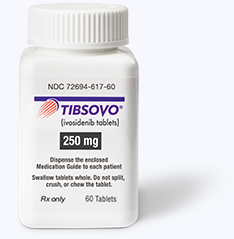Taking TIBSOVO FOR CHOLANGIOCARCINOMA (CCA)
Before you take TIBSOVO
Tell your healthcare provider about all of your medical conditions, including if you:
- Have any heart problems, including a condition called long QT syndrome
- Have problems with abnormal electrolytes, such as sodium, potassium, calcium, or magnesium levels
- Have nervous system problems
- Have problems with your kidneys or are on dialysis
- Have any liver disorders, including cirrhosis
- Are pregnant or plan to become pregnant. TIBSOVO may cause harm to your unborn baby. You should avoid becoming pregnant during treatment with TIBSOVO. Tell your healthcare provider right away if you become pregnant or think you might be pregnant during treatment with TIBSOVO
- Are breastfeeding or plan to breastfeed. It is not known if TIBSOVO passes into your breast milk. Do not breastfeed during your treatment with TIBSOVO and for 1 month after your last dose of TIBSOVO
Tell your healthcare provider about all the medicines you take, including prescription and over-the-counter medicines, vitamins, and herbal supplements.
Especially tell your healthcare provider if you take hormonal contraceptives. TIBSOVO may affect how hormonal contraceptives work and may cause them to not work well.
How to take TIBSOVO
TIBSOVO is an oral medication you can take at home. Take TIBSOVO exactly as your healthcare provider tells you to.





It's important to keep talking with your healthcare provider about your treatment plan and follow his or her instructions about treatment schedule and dose.
Information about the safe use of TIBSOVO
Medicines are sometimes prescribed for purposes other than those listed in a Medication Guide. Do not take TIBSOVO for conditions for which it was not prescribed. Do not give TIBSOVO to other people, even if they have the same symptoms you have. It may harm them. You can ask your pharmacist or healthcare provider for information about TIBSOVO that is written for healthcare professionals.
How you should store TIBSOVO
- Store TIBSOVO at room temperature between 68 to 77 °F (20-25 °C)
- Keep TIBSOVO in the original container
- Keep the container tightly closed with the desiccant canister (drying agent) inside to protect the tablets from moisture
- Keep TIBSOVO and all medicines out of reach of children

Possible side effects of TIBSOVO for cca
TIBSOVO may cause serious side effects, including:
- Changes in the electrical activity of your heart called QTc prolongation. QTc prolongation can cause irregular heartbeats and can be life-threatening. Your healthcare provider will check the electrical activity of your heart with a test called an electrocardiogram (ECG) during treatment with TIBSOVO. Tell your healthcare provider right away if you feel dizzy, lightheaded, or faint
- Guillain-Barré syndrome has happened in people treated with TIBSOVO. Your healthcare provider will monitor you for nervous system problems and will
permanently stop your treatment with TIBSOVO if you develop Guillain-Barré syndrome. Tell your healthcare provider right away if you develop any signs or symptoms of
Guillain-Barré syndrome, including
- Weakness or tingling feeling in your legs, arms, or upper body
- Numbness and pain on one side or both sides of your body
- Any changes in your ability to see, touch, hear, or taste
- Burning or pricking sensation
- Difficulty breathing
The most common side effects of TIBSOVO in adults with cholangiocarcinoma include:
-
 Fatigue
Fatigue -
 Nausea
Nausea -
 Abdominal pain
Abdominal pain -
 Diarrhea
Diarrhea -
 Cough
Cough -
 Hemoglobin
Hemoglobin
decreased
(anemia) -
 Decreased
Decreased
appetite -
 Fluid and
Fluid and
swelling in your
stomach area -
 Vomiting
Vomiting -
 Changes in liver
Changes in liver
function tests -
 Rash
Rash -
Talk with your healthcare provider about ways that may help you manage any side effects you may experience with TIBSOVO.


